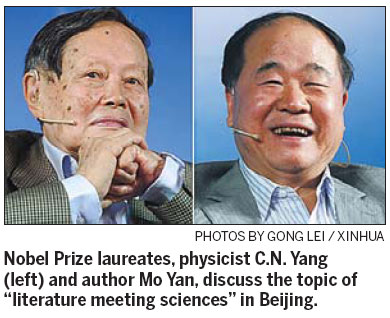Mo Yan promotes Chinese literature
Updated: 2013-05-22 05:38
By Mei Jia (China Daily)
|
||||||||

After keeping a low profile since he was crowned Nobel laureate in literature in December, Mo Yan is ready to face the media.
Last week, Mo Yan rejoined public events as chair of the International Writing Center under Beijing Normal University, and joined artist Fan Zeng for a conversation with physicist C.N. Yang on "literature meeting sciences", where he spoke in front of hundreds of people at Peking University.
"Let the trial on me begin," Mo Yan joked during an interview at BNU, where he obtained a master's degree in 1991.
"I hope the center will become a place where established writers from all over the world will feel free to write or do research, or communicate with fellow writers, critics and students," the author says.
"Or, it's also OK for them to do nothing, but just walk around the campus."
Mo Yan has been overwhelmed by media attention after receiving his Nobel prize. During this year's "two sessions" (National People's Congress and Chinese People's Political Consultative Conference) in March, Mo Yan, as a first-time CPPCC national committee member, was unwilling to speak to the media.
But he seemed a lot more lighthearted when he appeared at his alma mater on May 13 to assume the post of chairing the newly established BNU International Writing Center.
BNU is among the first Chinese universities to start an international writing center. A number of Chinese writers have been guests to centers of the same kind at foreign universities, such as the University of Iowa in the United States.
Zhang Qinghua, managing chair of the writing center, says it aims to be the nexus for international writers' exchanges in the country, while being home to Sinologists and foreign translators of Chinese literature and the cradle for younger generation of writers.
Chinese writer Jia Pingwa was named on the same day as the first stay-on-campus writer of the center. The Shaanxi-based author says he's planning to move to the capital for a while to create and share his literary thoughts.
The opening of the writing center also offered an opportunity for Chinese authors to assess Chinese literature and its place in the world.
At a forum on "Chinese literature going global" at BNU, writers, critics and researchers all agreed that the center offers a starting point for Chinese writers to embrace the world.
Chen Fumin, with Chinese Academy of Social Sciences, and Zhang Ning, with BNU, believes that Chinese literature is already an important part of the world literary scene.
Veteran critic Meng Fanhua points out "going global" means more acceptance from the Western mainstream.
"Mo Yan's Nobel win is an indicator of Chinese literature being recognized by the West," Meng says.
But Mo Yan says he'd rather not refer to his winning as an indicator.
"I'm a writer who's no different from other writers, who happened to get extra public attention because of random factors," he says. "I have said this and would like to repeat: There are many Chinese writers who deserve the prize other than me."
During the event in Peking University, Mo Yan and 91-year-old Yang shared their views on fame.
Yang said he felt "different" accepting the Nobel physics prize in 1957, being a Chinese-American among the majority of Westerners. Mo Yan joked that he suddenly felt like a subject of scientific research.
"All I was doing there at the Stockholm ceremony was observing people," he says.
The two discussed a wide range of topics including religion, style, nationality, talents and the China dream.
Mo Yan believes that Chinese literature has already reached a broad spectrum of the international audience.
"After decades of opening up, Chinese literature has achieved a lot. And it's the right time for us to strive to promote its influence outside," he says.
"The real indicator for me is when there are more international readers who read Chinese literature and are able to sympathize with Chinese writing from deep down, and whose souls become more beautiful after reading our works."
meijia@chinadaily.com.cn
(China Daily 05/22/2013 page19)

 Michelle lays roses at site along Berlin Wall
Michelle lays roses at site along Berlin Wall
 Historic space lecture in Tiangong-1 commences
Historic space lecture in Tiangong-1 commences
 'Sopranos' Star James Gandolfini dead at 51
'Sopranos' Star James Gandolfini dead at 51
 UN: Number of refugees hits 18-year high
UN: Number of refugees hits 18-year high
 Slide: Jet exercises from aircraft carrier
Slide: Jet exercises from aircraft carrier
 Talks establish fishery hotline
Talks establish fishery hotline
 Foreign buyers eye Chinese drones
Foreign buyers eye Chinese drones
 UN chief hails China's peacekeepers
UN chief hails China's peacekeepers
Most Viewed
Editor's Picks

|

|

|

|

|

|
Today's Top News
Shenzhou X astronaut gives lecture today
US told to reassess duties on Chinese paper
Chinese seek greater share of satellite market
Russia rejects Obama's nuke cut proposal
US immigration bill sees Senate breakthrough
Brazilian cities revoke fare hikes
Moody's warns on China's local govt debt
Air quality in major cities drops in May
US Weekly

|

|







